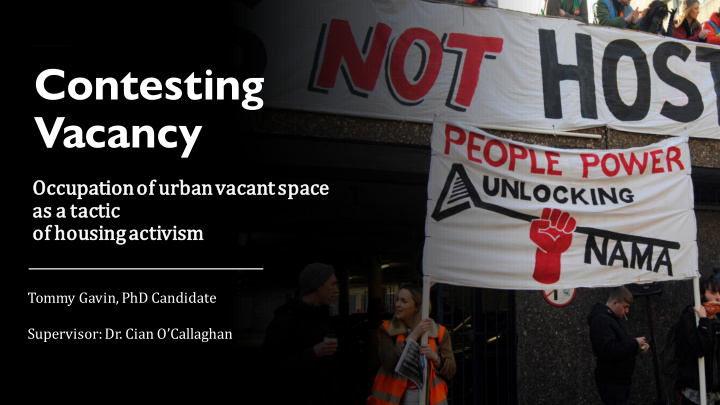



Contesting Vacancy Occupat ation of urban an vacan ant spac ace e as a tactic of housi sing activism sm Tommy Gavin, PhD Candidate Supervisor: Dr. Cian O’Callaghan
Topic Housing-focused social movements The emergence and development of occupation-based practices Vacant space in the capitalist city
Occupation-based practices are widespread, and are increasingly being analysed from a spatial perspective. Significance Vacancy meanwhile is under-theorised.
Project outline Project outline Empirical investigation of occupation-based engagements with urban vacancy in Dublin, tracing their emergence and development. Analysing vacancy as a feature of property relations and what is revealed when it is challenged Case study approach focusing on Dublin, with additional comparative cases Case study approach focusing on Dublin, in one or two other cities. with additional comparative cases in one or two other cities.
How have occupation-based strategies engaged with vacant urban space, and Research how can they contribute to our understanding of urban Question vacancy in the capitalist city.
• To examine and describe how occupation- based practices have emerged and developed. • To assess how activist conceptions of vacancy shape these practices and investigate how these conceptions change as a result of these practices. • To analyse policy measures intended to Aims and address vacancy and their relationship with activist engagements. Objectives ` • To develop theoretical insights about urban vacancy, and urban development trends generally, through the analysis of these engagements.
Core Literature Occupations Theorising and housing activism urban vacanc y O’Callaghan, C: Vasudevan, A: Occupation-based Governing vacancy will be a key practices as spatial politics. feature of post-crisis urbanisation. Lopez, M.A. A.M: Occupation-based Ferreri, M: Vacancy and re-use as practices as output of urban relations feature of the precarious city. and processes. Burkhol older, S : : Vacancy as reserve of Garcia ia-Lamarca: : Occupation-based urban shrinkage and expansion. practices as urban insurgency. Blom omley, N : : Property as a set of relations.
Secondary Literature Urban Political Economy Housing Studies Harvey, D: Urbanization of capital as a A. Aalbers: : space-shaping process. Housing must be central to critical urban studies, due to its extensive financialisation. Smit ith, N: Rent gap as driver of gentrification. Punch, M: Housing provision in the Lefebvre, H: (Social) space as a Irish context. (social ) product.
Methods • Document analysis: Activist documents, Policy documents, news media. • Participant Action Research and Observation. Interviews with key stakeholders on key sites. • Freedom Of Information (FOI) based investigative access to documents from relevant public bodies • My archive: - interview recordings - conference proceedings - fieldnotes and minutes - access to activist stakeholders
Freedom of Information Access: a novel research method Freedom of Information access is not tied to epistemic and ontological commitments, and can therefore play an important role in research projects of all types, and at all phases of those projects. Data obtained by a FOIA request can both complement and contextualise data obtained using other collection methods, enriching and adding validity to the conclusions that can be drawn from a piece of research. Ashley Savage & Richard Hyde (2014) Using freedom of information requests to facilitate research, International Journal of Social Research Methodology, 17:3, 303-317
Sketching the Dublin case
“At a time when so many families are at risk of homelessness and a government cut of over 18 million euro to homeless services, somebody needs to take action. That’s what the Bolt Hostel has done. They have shown that you can re-open derelict spaces for public good. — Press Release 27 th July 2015, Dublin Central Housing Action and the Irish Housing Network
Bolt Hostel Apollo House
Take Back the City May 2018 August 2018
Bibliography Aalbers, M. B. and B. Christophers(2014). "Centring Housing in Political Economy." Housing, Theory and Society 31(4): 373-394. • Burkholder, S. (2012). "The New Ecology of Vacancy: Rethinking Land Use in Shrinking Cities " Sustainability 4(6): 1154-1172. • Drudy, P . and M. Punch (2002). "Housing models and inequality: perspectives on recent Irish experience." Housing Studies 17(4): • 657-672. Ferreri, M., et al. (2017). "Living precariously: property guardianship and the flexible city." Transactions of the Institute of British • Geographers 42(2): 246-259. García‐ Lamarca, M. (2017). "From occupying plazas to recuperating housing: Insurgent practices in Spain." International Journal of • Urban and Regional Research 41(1): 37-53. Harvey, D. (2018). The limits to capital, Verso books. • Martínez López, M. A. (2017). "Squatters and migrants in Madrid: Interactions, contexts and cycles." Urban Studies 54(11): 2472- • 2489. • O’Callaghan, C., et al. (2018). "Governing urban vacancy in post -crash Dublin: Contested property and alternative social projects." Urban Geography 39(6): 868-891. • O’Callaghan, C. and P . Lawton (2016). "Temporary solutions? Vacant space policy and strategies for re -use in Dublin." Irish Geography 48(1): 69-87. Savage, A. and R. Hyde (2014). "Using freedom of information requests to facilitate research." International Journal of Social • Research Methodology 17(3): 303-317. Smith, N. (1987). "Gentrification and the rent gap." • • Vasudevan, A. (2015). "The autonomous city: Towards a critical geography of occupation." Progress in Human Geography 39((3)): 316-337.
Recommend
More recommend